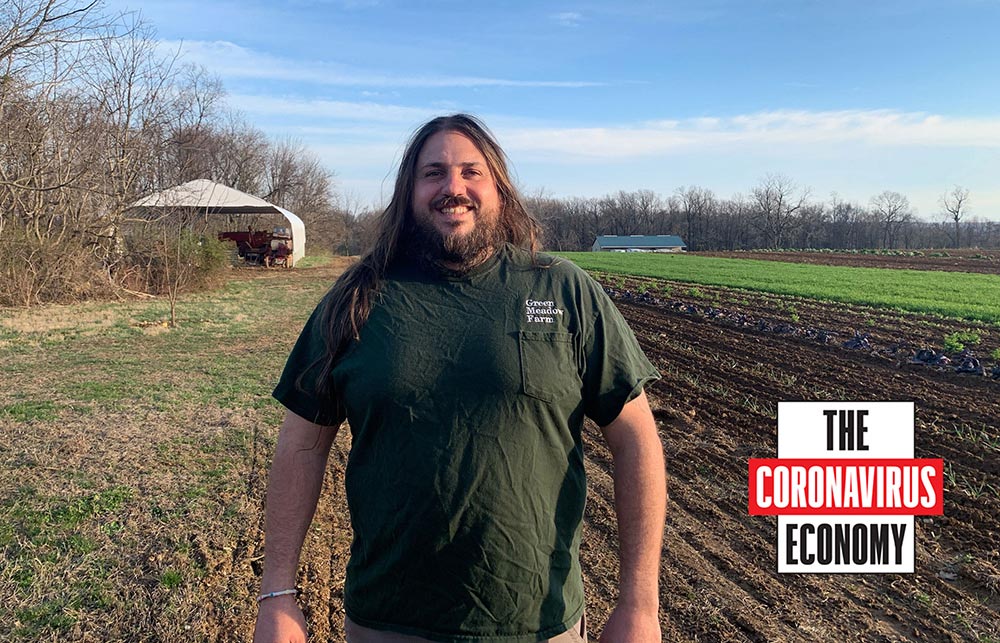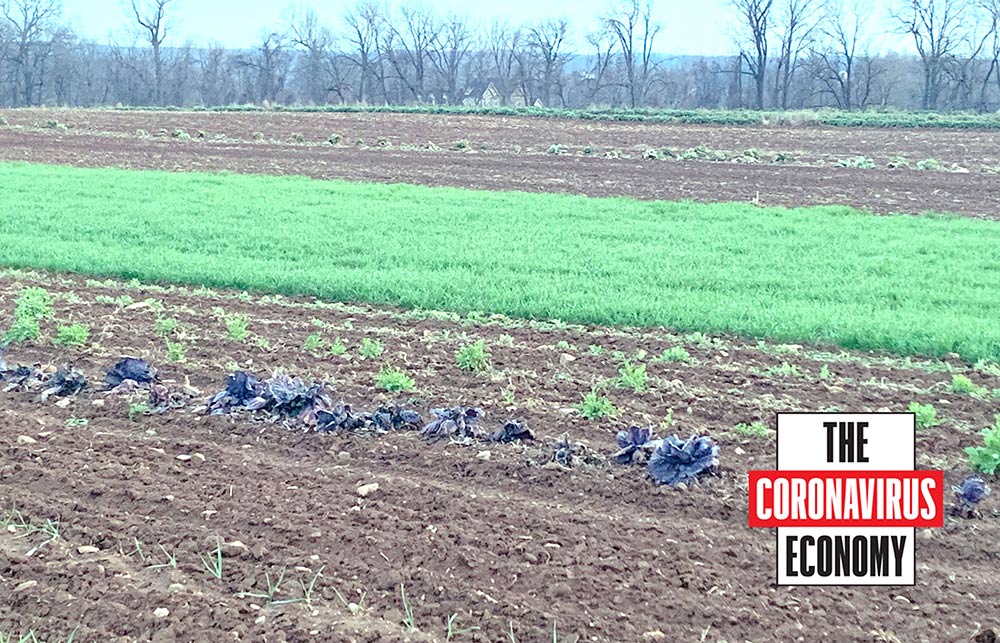伊恩·布伦德家务农的历史,可以追溯到他父亲那一脉六代以前。布伦德家的可持续农场“绿草地”占地22英亩,位于美国宾夕法尼亚州中南部的兰卡斯特县——一个拥有全美最高产的无灌溉农田的县城。布伦德说:“兰卡斯特县五分之一的工作都和农业有关。”
从汉密尔顿主持修建独立厅的日子算起,该县就成了费城真正意义上的生命线;而位于城镇和乡村之间的兰开斯特大道,绵延60英里,是为了方便农民送货而建。布伦德延续了这一传统,每周四开着卡车(冬季两辆,旺季最多四辆)给120位主厨的餐厅送货。但最近,这些客户的餐厅几乎都因新冠病毒的蔓延而暂时关闭了。
《财富》杂志对布伦德进行了采访,询问冠状病毒对其用工情况和未来计划的影响,也了解了他如何消化冠状病毒带来的情绪和财务上的压力。
以下采访内容经过精简及少量编辑。

《财富》:绿草地是如何起步的?
布伦德:我父亲家本来是务农的,后来他上了大学,毕业后在工程行业工作,但他一直有一个半英亩的花园。有一天,他发现农业才是他真正想做的事业。70年代末80年代初,他把阿米什人带去雷丁车站市场,后来他问能不能从他的花园里带一些东西来卖。那差不多算是我们农场的起源。厨师们来到市场,从他那里买些东西餐馆的原材料,再后来他买了辆二手小货车,装一个箱子,开始往城里送东西。
那时人们对当地可持续种植的农产品兴趣大吗?
刚起步时,想要把同样能在农产品区买到东西卖到两倍的价格,真的是一件很难的事情。你需要跟他们解释:“这是我昨天才摘的,也就是说昨天刚从地里挖出来的。如果你好好储存,能放上两礼拜,不像那些从外地运来的东西,你收到的时候可能已经从地里摘出来一两个礼拜了。”这是我父亲早期向人推销的卖点,后来我们在此基础上逐步发展。
农场是从什么时候开始真正发展起来?
大概在21世纪初,我决定以经营农场为生。虽然在此之前,批发业务就已经存在了。但真正爆炸式发展,真的有越来越多的人关注食物的来源是在21世纪初。我们每周都会将订货表通过电子邮箱发给大约650个人,其中约有120个人一整年都会下单。在淡季,比如假期刚过那段时间,每天可能只有35到40个订单。但在夏末秋初的旺季,每天最多能送75单。
大西洋中部正在步入春天,果树开了花,坡道上五颜六色。农场里的气氛怎么样?
当前的不确定性,使我们无法在春季全力以赴,这必然造成了很大阻碍。事发前一周,我们还送了53单。那些提供外卖的餐馆仍在下订单。差不多是平常业务量的10%。我们还用餐馆里回收的油为温室供能,现在也弄不到了。现有储备还够用一个季度,但如果不能为冬天做足储备,就将损失一大笔钱。
像绿草地这样的小型家庭农场经济上会受到什么影响?
哪怕经济景气时,靠种地赚钱也是很困难的。为什么农民和厨师能和谐相处?至少在我看来,全国农民和厨师整体上相处地非常和谐。这或许因为,我们把拥有的一切,无论是经济还是精神上的一切,都投入到了农场和餐馆中。但得到的经济回报却少得可怜。我真觉得,美国政府被打了个措手不及。如果说有什么事能让大家认识到,事情真的需要发生改变,就是当前正在发生的了。
这是当地农民的普遍看法吗?
除了农场种地的农民,我很少和本地其他农民交流。我爸爸、我还有我们的工作人员,我们不是兰卡斯特县农业的典型代表。

绿草地的主要客户是餐厅,眼下你要如何调整农场业务?
当一切都在走下坡路时,我的得力助手戴夫·卡尔说:“伙计,我们做个面向普通消费者的产品盒子吧。”我知道,做农场共享、农场盒子或社区支持农业都不是什么新鲜事,但对我们来说却是全新的,真的就像离开了水的鱼。我们目前在做30美元的单盒和55美元的双盒,还有肉类和奶制品盒子,在费城城内及周边有四个取货点。
农场盒子里一般都有什么?
现在,每个人的免疫系统都比任何时候更需要增强,所以我们会把农场种植的天然抗病毒或者对人体免疫系统非常有益的食材放进盒子。例如,本周我们会配送圣罗勒和茼蒿,这是一种日本菊科植物,在亚洲有些地方当作补品。还有蜂蜜、蘑菇、西洋菜苔,都非常有营养,味道也很好。
农场盒子能维持农场这段时间的运营吗?
目前为止,我们已经有60个注册用户,且有望达到100个。但说实话,我现在根本没有考虑自己。我想的是我们的屠夫,他有抵押贷款和账单要付,还有15到20个农民为我们种地。我有一个鸡蛋供应商约翰·B·金,去年为我扩增了养殖量。现在鸡开始下蛋,而他必须要给那些鸡蛋找到出路。我们需要维持下去,这样才不会输得一败涂地,但我们也必须尽可能帮助一路上同行的人。
你的日常工作都是在自然环境中,会不会因此对现在的情况有些不同的理解?
我想任何在自然中或户外工作的人都会说,会的。在这个时刻,我们需要反思,意识到自己太理所当然地看待一切了。这是我们历史上的重要时刻,需要回顾过去,作出反思:“伙计,在此之前,我们太把一切都当成是理所当然的了。”希望我们能有所改变。
未来有什么种植计划?
我们还是要做本该做的事。可能会在玉米和谷物上多花点精力,但仍然在种西红柿、辣椒。将要应对的只是7月能不能卖出18箱辣椒这种不确定性。但我们还是会继续耕种。只要还能继续,我们就会继续干下去。(财富新闻网)
译者:Agatha
伊恩·布伦德家务农的历史,可以追溯到他父亲那一脉六代以前。布伦德家的可持续农场“绿草地”占地22英亩,位于美国宾夕法尼亚州中南部的兰卡斯特县——一个拥有全美最高产的无灌溉农田的县城。布伦德说:“兰卡斯特县五分之一的工作都和农业有关。”
从汉密尔顿主持修建独立厅的日子算起,该县就成了费城真正意义上的生命线;而位于城镇和乡村之间的兰开斯特大道,绵延60英里,是为了方便农民送货而建。布伦德延续了这一传统,每周四开着卡车(冬季两辆,旺季最多四辆)给120位主厨的餐厅送货。但最近,这些客户的餐厅几乎都因新冠病毒的蔓延而暂时关闭了。
《财富》杂志对布伦德进行了采访,询问冠状病毒对其用工情况和未来计划的影响,也了解了他如何消化冠状病毒带来的情绪和财务上的压力。
以下采访内容经过精简及少量编辑。
《财富》:绿草地是如何起步的?
布伦德:我父亲家本来是务农的,后来他上了大学,毕业后在工程行业工作,但他一直有一个半英亩的花园。有一天,他发现农业才是他真正想做的事业。70年代末80年代初,他把阿米什人带去雷丁车站市场,后来他问能不能从他的花园里带一些东西来卖。那差不多算是我们农场的起源。厨师们来到市场,从他那里买些东西餐馆的原材料,再后来他买了辆二手小货车,装一个箱子,开始往城里送东西。
那时人们对当地可持续种植的农产品兴趣大吗?
刚起步时,想要把同样能在农产品区买到东西卖到两倍的价格,真的是一件很难的事情。你需要跟他们解释:“这是我昨天才摘的,也就是说昨天刚从地里挖出来的。如果你好好储存,能放上两礼拜,不像那些从外地运来的东西,你收到的时候可能已经从地里摘出来一两个礼拜了。”这是我父亲早期向人推销的卖点,后来我们在此基础上逐步发展。
农场是从什么时候开始真正发展起来?
大概在21世纪初,我决定以经营农场为生。虽然在此之前,批发业务就已经存在了。但真正爆炸式发展,真的有越来越多的人关注食物的来源是在21世纪初。我们每周都会将订货表通过电子邮箱发给大约650个人,其中约有120个人一整年都会下单。在淡季,比如假期刚过那段时间,每天可能只有35到40个订单。但在夏末秋初的旺季,每天最多能送75单。
大西洋中部正在步入春天,果树开了花,坡道上五颜六色。农场里的气氛怎么样?
当前的不确定性,使我们无法在春季全力以赴,这必然造成了很大阻碍。事发前一周,我们还送了53单。那些提供外卖的餐馆仍在下订单。差不多是平常业务量的10%。我们还用餐馆里回收的油为温室供能,现在也弄不到了。现有储备还够用一个季度,但如果不能为冬天做足储备,就将损失一大笔钱。
像绿草地这样的小型家庭农场经济上会受到什么影响?
哪怕经济景气时,靠种地赚钱也是很困难的。为什么农民和厨师能和谐相处?至少在我看来,全国农民和厨师整体上相处地非常和谐。这或许因为,我们把拥有的一切,无论是经济还是精神上的一切,都投入到了农场和餐馆中。但得到的经济回报却少得可怜。我真觉得,美国政府被打了个措手不及。如果说有什么事能让大家认识到,事情真的需要发生改变,就是当前正在发生的了。
这是当地农民的普遍看法吗?
除了农场种地的农民,我很少和本地其他农民交流。我爸爸、我还有我们的工作人员,我们不是兰卡斯特县农业的典型代表。
绿草地的主要客户是餐厅,眼下你要如何调整农场业务?
当一切都在走下坡路时,我的得力助手戴夫·卡尔说:“伙计,我们做个面向普通消费者的产品盒子吧。”我知道,做农场共享、农场盒子或社区支持农业都不是什么新鲜事,但对我们来说却是全新的,真的就像离开了水的鱼。我们目前在做30美元的单盒和55美元的双盒,还有肉类和奶制品盒子,在费城城内及周边有四个取货点。
农场盒子里一般都有什么?
现在,每个人的免疫系统都比任何时候更需要增强,所以我们会把农场种植的天然抗病毒或者对人体免疫系统非常有益的食材放进盒子。例如,本周我们会配送圣罗勒和茼蒿,这是一种日本菊科植物,在亚洲有些地方当作补品。还有蜂蜜、蘑菇、西洋菜苔,都非常有营养,味道也很好。
农场盒子能维持农场这段时间的运营吗?
目前为止,我们已经有60个注册用户,且有望达到100个。但说实话,我现在根本没有考虑自己。我想的是我们的屠夫,他有抵押贷款和账单要付,还有15到20个农民为我们种地。我有一个鸡蛋供应商约翰·B·金,去年为我扩增了养殖量。现在鸡开始下蛋,而他必须要给那些鸡蛋找到出路。我们需要维持下去,这样才不会输得一败涂地,但我们也必须尽可能帮助一路上同行的人。
你的日常工作都是在自然环境中,会不会因此对现在的情况有些不同的理解?
我想任何在自然中或户外工作的人都会说,会的。在这个时刻,我们需要反思,意识到自己太理所当然地看待一切了。这是我们历史上的重要时刻,需要回顾过去,作出反思:“伙计,在此之前,我们太把一切都当成是理所当然的了。”希望我们能有所改变。
未来有什么种植计划?
我们还是要做本该做的事。可能会在玉米和谷物上多花点精力,但仍然在种西红柿、辣椒。将要应对的只是7月能不能卖出18箱辣椒这种不确定性。但我们还是会继续耕种。只要还能继续,我们就会继续干下去。(财富新闻网)
译者:Agatha
On his father Glenn’s side, Ian Brendle’s family goes back six generations in agriculture. The Brendles’ sustainability-focused farm, Green Meadow, spreads out across 22 acres of Lancaster County, the south-central Pennsylvania district boasting the most productive nonirrigated farmland in the U.S. “One in every five jobs in Lancaster County is ag-based,” Brendle says.
The county has been a literal lifeline for Philadelphia from the days Hamilton hung around Independence Hall; Lancaster Avenue, stretching 60 miles between town and country, was established so farmers could deliver their goods. Brendle continues in that tradition, running delivery trucks (two in the winter, up to four in the high growing seasons) every Thursday from Green Meadow to 120 chef clients—nearly all of whose restaurants have been temporarily closed by the coronavirus pandemic.
Fortune spoke with Brendle for a new series, The Coronavirus Economy, to ask about how COVID-19 has affected his employment status and his plans for the future, and to get a sense of how he is handling this news both emotionally and financially.
The following interview has been condensed and lightly edited.
Fortune: How did Green Meadow get started?
Brendle: My dad was born into farming, then went to college and worked in engineering, but he always kept a half-acre garden. One day he decided farming was what he wanted to do. He started by taking Amish guys down to Reading Terminal Market back in the late ’70s, early ’80s, then he asked if he could bring a few items from his garden to sell. It just sort of grew from there. Chefs would come in and buy stuff from him to use at the restaurants, and eventually he took an old pickup truck, threw a box on it, and started taking stuff into the city.
Was there much interest in local, sustainably grown produce back then?
When my dad first started, it was really a tough sales pitch to try to charge twice the amount of money for the same type of thing [chefs] would buy down at the produce junction. It took explaining, “Well, hey, I just picked this yesterday. So it’s only been out of the ground since yesterday. If you take care of it, you’ve got two weeks until you have to use it as opposed to something that’s shipped in that could have been picked 10 or 14 days before the time that you receive it.” So that was really the selling point that he drove home early on, then just kind of built on that.
When did things really take off for the farm?
The wholesale business was already in place before I decided to make [farming] my livelihood around the early 2000s. That’s when you could say it really exploded, and I saw more and more people really, really being into where the food came from. Our weekly order list goes out to about 650 individual email addresses, and about 120 order consistently through the year. At slow times, like right after the holidays, we might only have 35 or 40 deliveries. Then at the height, late summer into early fall, we’re looking at up to 75 deliveries to make in one day.
The mid-Atlantic is on the precipice of spring—fruit trees are flowering, ramps are popping. What’s the mood like on the farm?
Dealing with the uncertainty, not being able to just go 100% full bore into spring season has definitely been a real kick in the ass. The week before everything went down, we made 53 deliveries. The restaurants that are doing takeout and delivery are still ordering. I would say that represents 10% of our typical business. We also use recycled fryer oil from restaurants to power our greenhouses, and that’s not available now. We have enough for the rest of this season, but if we don’t have a stockpile built up for winter, we’re missing out huge.
What’s the economic impact of that for a small family farm like Green Meadow?
In good times, it’s incredibly hard to make money farming. I think one of the reasons why farmers and chefs get along so well—and I think, as a whole throughout the country, farmers and chefs get along really well—you pour everything you have into [a farm or a restaurant] both financially and psychologically, and you get very little financial return. I really feel like the U.S. government was caught with its pants down. If there was ever a more glaring notification to everyone that things truly need to change in this country, this is it.
Is that a common sentiment among the farmers in your area?
Besides the people who grow stuff for us, I don’t really talk to other farmers in my area. My dad and I and our crew here, we are not the norm in agriculture in Lancaster County.
With chefs as Green Meadow’s primary customers, how are you adapting the farm’s business?
So basically, as everything was going down, my right-hand man, Dave Carr, he was like, “Dude, let’s just do a produce box for the public.” I know doing a farm share or farm box or CSA is nothing new, but it’s totally new to us—fish out of the water for real. We’re doing a $30 single farm box and a $55 double farm box, as well as meat and dairy boxes, and have four pickup locations in and around Philly.
What’s in a typical farm box?
Right now, more than ever, everyone’s immune system needs to be as boosted as possible, so we’re going to be putting in things we grow that are naturally antiviral or really good for your immune system. This week, for example, we’ll have holy basil and shungiku, which is a Japanese chrysanthemum and used in parts of Asia as a cold tonic. Honey. Mushrooms. All the rabes, which are incredibly nutritious and taste good, too.
Do you think the boxes will help carry the farm during this time?
We have about 60 sign-ups so far and are hoping to get to about 100, but honestly I’m not even thinking about ourselves right now. I’m thinking about our butcher, who’s got a mortgage and bills to pay, and our network of 15 to 20 farmers who also grow for us. I’ve got an egg guy, John B. King, who increased his flock for me last year. This is when chickens start to go into cruise control, and he’s got to move those eggs. We need to stay afloat so that we don’t lose our ass, but we also have to help as many other people along the way as we can.
Does working so closely with nature on the day to day give you a different perspective on the situation?
I think anyone that works in the elements or works outside would say it does. I think this is a time where we’re able to reflect and realize we all take things for granted. This is that time in our history where we’re going to look back and be like, “Man, up until that point we took so much for granted.” And hopefully we change.
What does the planting plan look like moving forward?
We’re still going to do all the same shit that we were going to do. We might dip a little bit more into the acreage for corn and grain, but we’re still putting tomatoes out, still putting peppers out. I just need to deal with the unknown of whether I am going to be able to sell 18 boxes of peppers in July. But we’ll keep farming our ground. We’ll keep going till the wheels fall off, man.






